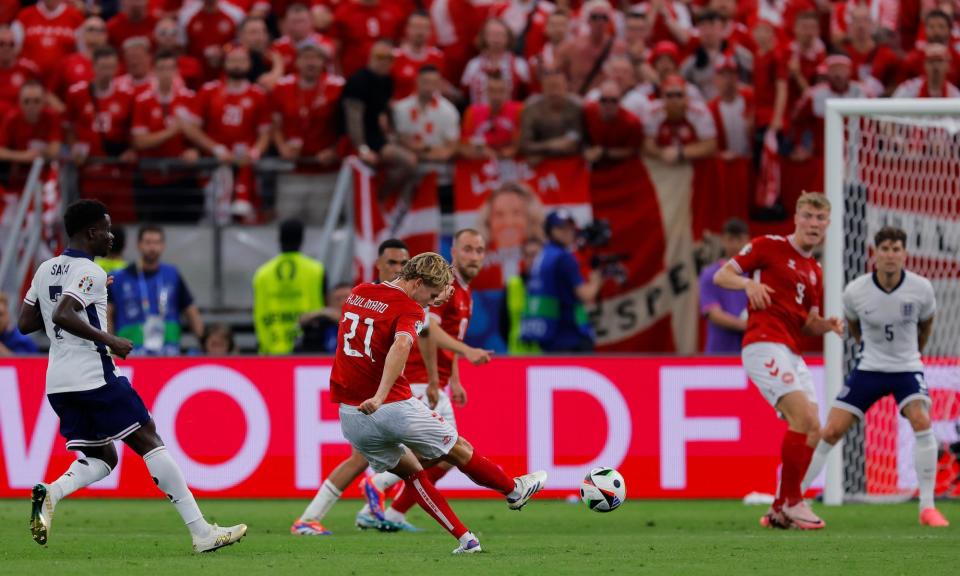Long-range belters leading the goals trend in Euro 2024 group stage

Long-distance goals
There is no finer sight in football than a goal lashed in from distance and Euro 2024 has produced a plethora of memorable strikes to punctuate an almost endless succession of pulsating group games.
Nicolae Stanciu’s rocket in Romania’s 3-0 win against Ukraine is the pick of the bunch: a swerving, dipping first-time shot whipped spectacularly into the top corner from 20 yards. Ukraine’s goalkeeper, Andriy Lunin, dived but probably shouldn’t have bothered.
Stanciu’s screamer was nearly matched by Xherdan Shaqiri’s slick finish for Switzerland in the 1-1 draw against Scotland. The former Stoke forward’s effort also originated from a defensive error and featured a comparable helping of whip and curl, almost a left-footed mirror image of Stanciu’s. A wonderful curling hit by Lukas Provod, for the Czech Republic against Portugal, was of comparable quality.
Those spectacular efforts were rivalled by Morten Hjulmand’s crisp, powerful drive for Denmark that pegged England back to a 1-1 draw in Frankfurt. On the BBC, Gary Lineker exaggerated when calling it “one in a million”, but any shot that cannons in off a post earns extra points for aesthetics.
Florian Wirtz had set the tone with a goal from outside the area (but inside the “D”) by putting Germany ahead against Scotland on the opening night – although Angus Gunn should have done better – before Emre Can sealed the rout with a sweet stoppage-time curler from similar distance. Niclas Füllkrug’s goal, the hosts’ third in a 5-1 win, deserves a mention for power and purity.
Mert Muldur’s astonishing volley for Turkey against Georgia was on the edge of the area – just inside – but Arda Guler’s smooth, sweeping finish meant the Real Madrid midfielder had announced his talent on the biggest stage and punish Georgia’s defensive carelessness. Michel Aebischer (Switzerland), Nicolò Barella (Italy), Cody Gakpo (Netherlands) and Erik Janza (Slovenia) have also found the back of the net from outside the area. Gakpo’s and Janza’s efforts were deflected and the Slovenian’s thunderous hit was spectacular despite taking a nick off a defender.
With such a proliferation of long-distance goals and clean strikes, the players evidently feel confident of controlling Adidas’s “Fussballliebe” (Love of football), which we can be sure is a significant upgrade on the dreaded Jabulani of 2010.
Own goals
Spain’s attacking patterns and mesmeric passing had Italy, the reigning champions, clinging on in Group B on Thursday. Driven on by the quicksilver Nico Williams and the 16-year-old Lamine Yamal, Spain dominated and might have scored five or six with more clinical finishing. But they needed a second-half own goal via Riccardo Calafiori’s knee to earn three points.
The unfortunate Italian defender was the fifth player inside a week to put through his own net: Antonio Rüdiger, somewhat comically, glanced a header into Germany’s goal to hand Scotland an opening-night consolation. Maximilian Wöber’s own goal gifted France victory on Monday while Robin Hranac unintentionally kicked off Portugal’s comeback in the 69th minute in Leipzig the next day.
The most freakish incident was surely Klaus Gjasula’s for Albania, though: Berat Djimsiti threw his body in the way of Luka Sucic’s shot, only for the ball to cannon into Gjasula and ricochet back into the net. Happily for the 34-year-old, who has 10 German clubs on his CV and has been released by Darmstadt this summer, he popped up with a 95th-minute equaliser to snatch a point.
Late goals
The tournament has also been notable for stoppage-time goals: there have been six scored beyond 90 minutes, including several decisive to the final result. Gjasula’s aforementioned effort salvaged a 2-2 draw against Croatia in Group B, sparking passionate celebrations by his manager, the former Arsenal full-back Sylvinho.
Can’s late goal against Scotland did not change the result – neither did Breel Embolo’s neat finish for Switzerland against Hungary. Kerem Akturkoglu’s breakaway strike for Turkey came in the 97th minute and sealed a 3-1 win and was most notable for being satisfyingly stroked into an empty net after the Georgian goalkeeper, Giorgi Mamardashvili, went up for a corner.
Portugal’s encounter with the Czech Republic burst into life late, Francisco Conceição slotting a dramatic winner for the 2016 champions in the second minute of stoppage time while Luka Jovic struck with a header in the 95th minute for Serbia against Slovenia, allowing them to keep dreaming of progress from Group C.
Late drama, own goals and a multitude of long-rangers are characterising Euro 2024. Is a Tony Yeboah-style volley, crashing in off the crossbar, too much to ask for?

 Yahoo Sports
Yahoo Sports 
